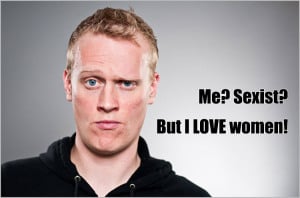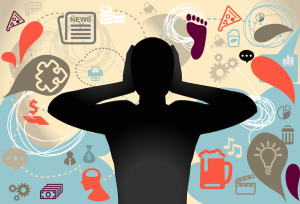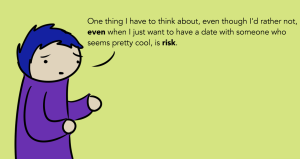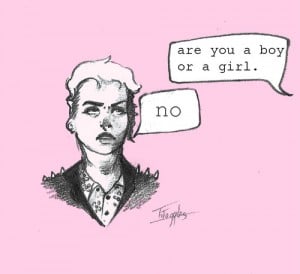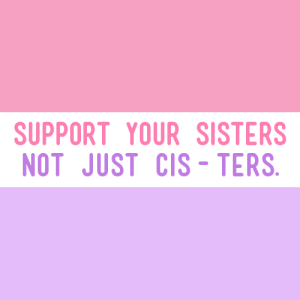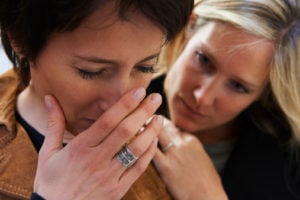
A person sits in bed with their hands on their abdomen, an expression of pain on their face.
Originally published on xoJane and republished here with their permission.
Ever since I was eleven years old, I’ve experienced debilitating, life-altering pain with my period. It took thirteen years to finally get a doctor to take me seriously.
Every month, for at least a day or two, my period would land me in bed, completely immobilized with pain, and desperately clinging to a heating pad for some semblance of relief. I would lay with my legs splayed out like I was giving birth and try to keep my moans of agony to a minimum.
That was “fine.”
Painkillers were useless. The only solution to my period was to wait to pass out from the pain and sleep it off. If I did try to go to work or school, I would be completely non-functional and most likely end up blacking out at some point.
“You’re fine.”
I can vividly remember one time when the poor football captain in my high school chemistry class was chosen to escort me to the nurse’s office. I was white as a sheet, could barely see the floor in front of me, and was half-walking, half-crawling down the hall.
Mr. Football was so freaked out by my medical emergency that he was practically hugging the wall to get away from whatever contagious disease I had.
But I was “fine.”
Aside from my menstrual pain, my life was ruled by a long list of other oh-so-fun symptoms. This included heavy bleeding, incredibly irregular periods, severe acne (which I’m still taking medication for at age 25), fatigue, and probably a lot of others I didn’t even think were related to my menstrual cycle. Despite trying everything, I couldn’t get rid of a single one of these symptoms.
In May 2013, when I was 23 years old, I had been experiencing intense lower-back pain and stomach aches for days, making it almost impossible to eat anything. I remember sitting in my office at work, writhing in my desk chair because I couldn’t get comfortable. I knew something was wrong, but I had no idea what.
Finally, I couldn’t do it anymore. Lying on the floor of my apartment with a phone pressed to my face, I begged my boyfriend (now husband), Andrew, to come get me and take me to the emergency room.
After hours of sitting in pain and then being hooked up to some morphine, I was wheeled out for a CT scan that the doctors were certain would detect kidney stones. So I had accepted my fate and expected to feel even worse for a few days.
But the doctors came in later to tell me what I absolutely didn’t want to hear: “You’re fine.”
I put up with this for another year until I was tired of being “fine.” My symptoms were getting worse, happening outside of my period, and I was even having pain during pelvic exams and intercourse.
So I did what any other woman with Internet access would do. I Googled my symptoms.
I pored over article after article that kept leading me to one word: endometriosis. More investigating pointed me to support groups full of people who were all told the same things I was.
“You’re fine.”
“Everyone hurts during their period. Don’t be so dramatic.”
“You have to get used to this. It’s all in your head.”
I wanted to sob with relief. This was a real thing. There was a name for what I had. I didn’t “make up” my pain, and I didn’t have to feel like this anymore.
I’m usually really hesitant to say I have a condition without confirmation from a doctor. But endometriosis was such a glaringly obvious answer to the pain I’d had for most of my life.
Every month, the uterus sheds its endometrium, which is also known as a period. But for people with endometriosis, some of these fluids stay in the body, abnormally implanting to areas outside of the uterus and causing adhesions, scarring, and invasive nodules. This leads to all of the symptoms I was experiencing, as well as others – like infertility, ectopic pregnancies, and miscarriages.
This chronic, incurable condition affects millions of people around the world, but due to a lack of knowledge in the general public and medical community, diagnoses are often hard to come by.
The average person waits ten years before finally being told they have endometriosis. Here I was, going on thirteen years.
I went to my OB/GYN and ever-so boldly said, “Hey. I have endometriosis.” Unsurprisingly, my doctor didn’t seem convinced. As I would soon find out, not very many doctors are well-versed in this condition.
My general practitioner never once recommended that I see an OB/GYN for my unidentifiable pain, and my OB/GYN didn’t seem at all alarmed by my ER incident.
Having read about the procedure for diagnosing endometriosis, I practically demanded that my doctor prescribe it. After trying to argue with me, he begrudgingly scheduled for me for a transvaginal ultrasound that was necessary to rule out anything else before my diagnostic surgery.
Even though I got what I wanted, I was terrified. More than anything, I was worried that this surgery – my first ever – would be all for nothing. I would spend an absurd amount of money on an invasive procedure, only to find out that no, I didn’t have endometriosis. Instead, my doctors were right, and I just couldn’t handle my pain. I was exaggerating very normal symptoms. I was “fine.”
The week before Christmas, Andrew and I sat in the hospital waiting room while I crushed his hand in my own. I was so scared for my surgery that it was written all over my face. My nurses looked at me as soon as I got settled in my room, turned around, and called my husband from the waiting room to sit with me.
My doctor came in to talk to me about my surgery, reiterating information I had already heard. Wait, let me clarify: My doctor talked to my husband about my surgery while occasionally glancing at me. He even had the nerve to say that he doubted they would find anything significant before walking out the door.
I almost burst into tears like I had after an appointment with my OB/GYN prior to my surgery. I crumbled into a ball in the driver’s seat of my car, sobbing, and saying, “I just want someone to believe me. I hurt. I don’t want to hurt anymore. I’m not making this up.”
Here I was, about to be cut open, and my doctor was dismissing my pain again. “You’re fine.”
Waking up in an anesthesia fog after my surgery, one of the first things I saw was my doctor’s face, peering over me. “Tracy, you definitely have endometriosis.”
Even though I couldn’t talk with a breathing tube being down my throat, I wanted to scream with joy. For the first time in my life, I had an answer. It was the happiest I’d ever been to hear that I wasn’t “fine.”
Looking back on my whole experience, it still baffles me that no one trusted me to know my own body. From lying immobile in the nurse’s office in high school to blacking out after a pelvic exam at age 24, never once did a doctor seem to believe me when I said I needed help.
Why is that? Why are we so hesitant to believe that people can and should be stewards of their own bodies? That they know when something’s wrong or what their bodies need? That they should have the autonomy to speak for their bodies and to make decisions that impact them?
Even after my diagnosis, my OB/GYN continued to speak directly to my husband about my condition and treatment options, instead of me. The worst part was that he was only concerned with me having a baby before endometriosis scarring would make that difficult.
I had been married less than a year and wasn’t even remotely ready for kids. I left his office with absolutely no solutions to manage the pain that was still crushing my uterus.
That was the last day I saw him. I immediately transferred care to a new doctor who listens to me.
I never want another person to go through what I did. As a community, we need to do better. We need to support reproductive rights and listen to people when they express what they need. We need to trust people to know their own bodies best.
In the meantime, please be your own advocate. Please don’t accept “fine” when you know you’re not. Be proactive with your health, speak up for what you need, and don’t wait around with doctors who won’t work with you.
Until we reach a day where “fine” isn’t used to describe someone incapacitated by pain, I won’t stop sharing my story.
[do_widget id=’text-101′]
Tracy L. Fischer lives in the Indianapolis area with her husband and schnauzer-poodle and works in non-profit. Her hobbies include singing power ballads at karaoke, trying to look really cool at the gym, fawning over The Property Brothers, and getting emotional about books. You can read all about her broken uterus at www.stillsunflowers.com and follow her on Twitter at @stillsunflowers.
Search our 3000+ articles!
Read our articles about:
Our online racial justice training
Used by hundreds of universities, non-profits, and businesses.
Click to learn more






